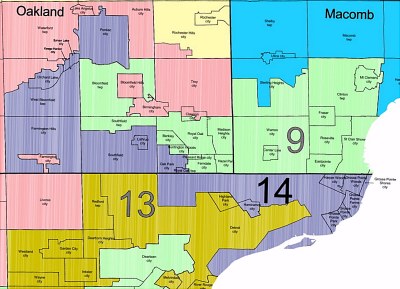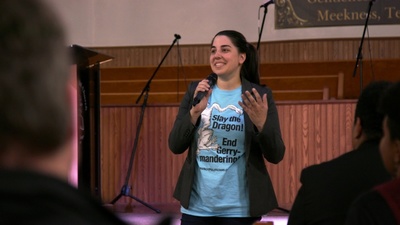A documentary film about Michigan’s grassroots battle in 2017-18 against political gerrymandering has received a couple of rave reviews after making its debut this weekend at the Tribeca Film Festival in New York City.
The film, “Slay the Dragon,” prominently features Katie Fahey (above) of west Michigan, who at age 27 founded and led the nonprofit group Voters Not Politicians which successfully led a petition drive to end state legislators’ control over the drawing of election districts.
Film critic Owen Gleiberman of Variety wrote in his review that “Slay the Dragon” is an “incisive and stirring” documentary that “feels like a moral game-changer.”
He added: “’Slay the Dragon’ is the most important political film of the year, and it may prove to be one of the key political films of the decade.”

Over at Slashfilm.com, critic Caroline Cao called the film a “a tough but necessary documentary about the decay of democracy.”
Much of the film focuses on the distorted impact of heavily gerrymandered legislative districts in Michigan and Wisconsin that have given Republican lawmakers outsized influence on every issue that arises in the state capitol building.
“Slay the Dragon” opens with the Flint Water Crisis in 2014, when officials of Flint, Michigan, made a costly decision that poisoned the predominantly black residents of Flint,” Cao wrote. “Brown liquid poured from household sinks, deaths occurred, and children were exposed to the contamination. The Flint Water Crisis is still to this day far from resolved. The government leadership’s laxness in fixing the problem attributed to a sense of security over their government seats. If their (legislative) maps guarantee them re-election, why bother with the woes of marginalized voters?”
The title of the film, directed by Barack Goodman and Chris Durrance, refers indirectly to 19th Century Massachusetts governor Elbridge Gerry, who is credited with drawing the first blatantly partisan district with zig-zagging boundaries. His critics said the district looked like a salamander and so the term gerrymandering was born. The Michigan petition drive created T-shirts for the volunteers that featured a drawing of Gerry’s infamous district, which actually looked more like a large, imposing lizard. The shirts declared, “Slay the dragon.”
Though the documentary tackles one of the most arcane aspects of the political system, Gleiberman concluded that the documentary is “an incisively made and morally suspenseful film, at once chilling and stirring. It deals with gerrymandering on a human level — as the endgame in the fight for democracy.”
In his review, which was also published on Yahoo.com, Gleiberman sees Fahey as the hero of the film:
Katie Fahey, a young woman from Michigan with no background in politics and no connections, gets on social media to try and jumpstart a grassroots movement, and lo and behold, she does it. She names it Voters Not Politicians, and throughout the film we see it gather steam. Fahey is a stirring figure, because she starts off seeming like a passionate ordinary person, and by the end of the movie her fervor and rhetoric have become cleansing enough that I started to see her as a born politician (even though that doesn’t seem to be her intent).
In fact, Fahey recently announced that she will lead a national group, The People, that aims to create reforms and political movements at the grassroots level, much like Voters Not Politicians
On Saturday night, Fahey was part of a panel discussion featuring journalists after the film’s debut at the SVA Theater in downtown Manhattan.
Cao explains that “with clipboards, pens, and petitions ready,” Fahey and her team tirelessly campaigned for what became known as Proposal 2, an initiative to create an independent citizens commission that would draw the redistricting maps. It was a most unlikely underdog effort to take on the political establishment, and at one point Fahey nearly reached a breaking point as she addressed the troops in an Internet chat.
“I was most affected by a heartbreaking moment where Fahey sobs on livestream as she contemplates all their efforts could be for naught underneath an imposing system,” Cao wrote.
Of course, all Michiganders know about the happy ending — an overwhelming victory for Proposal 2 at the ballot box last November that will live in Michigan political lore for many decades to come.









